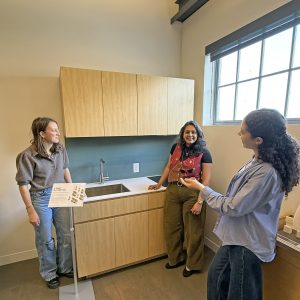On behalf of the American Family Institute for Corporate and Social Impact (“the Institute”), I am excited to announce our new investment in Kit Switch.
It’s no secret that the U.S. faces a severe shortage of affordable housing. We’re short over 7 million homes for extremely low-income households [National Low Income Housing Coalition, 2025], and many of the homes that do exist are aging fast. In California, 75% of all buildings need retrofits to meet climate goals by 2030, but only 1% of the building stock is upgraded each year [IEA, 2022]. That pace needs to increase – and fast.
The bigger problem, though, is renovating existing and functional buildings takes time. Over 850,000 low-income housing tax credit (LIHTC) units will see affordability restrictions expire between 2025 and 2038, triggering a period where they need recapitalization or risk conversion to market-rate [Yardi Matrix, 2025]. Many of these will pursue preservation deals involving substantial rehabilitation.
At the Institute, we spent the last year digging into this problem. In 2025, we introduced Housing Access as a new investment thesis in Fund II, looking to support innovations that could make construction faster, cheaper and more sustainable. That’s what brought us to Kit Switch, our first investment in Housing Access.

A Smarter Way to Build Interiors
Kit Switch designs modular interior systems, specifically kitchens and bathrooms, for multifamily buildings. Think: plug-and-play kits that include kitchen cabinets, appliances like dishwashers, cooking range and more that can be installed in 1 day with 2 workers. The kits are ADA-compliant, code-aligned, easy and quick to install, and designed with long-term maintenance in mind. In addition, their designs aren’t just functional, they’re dignified.
The kits are resource-efficient and fully electric. They use low-assembly methods, durable materials and design sub-components to be disassembled and reused. These building practices create a product with lower embodied and operational carbon, and less landfill waste.
What makes Kit Switch stand out isn’t just that they’re modular; it’s how thoughtfully they’ve integrated their system into the realities of the construction world. Kit Switch slots neatly into existing workflows. It’s a solution that doesn’t ask the construction industry to change everything at once, which makes it far more scalable.
Meeting the Moment for Housing Retrofits
Half of the U.S.’s 44 million multi-family units were built before 1980 [ScienceDirect, 2023]. Many of those are entering a critical window for recapitalization or rehabilitation. At the same time, state and city programs like Project Homekey in California and Housing our Neighbors with Dignity Act (HONDA) in New York are unlocking public funding for adaptive reuse, turning old hotels, dorms, and offices into housing. Project Homekey has funded 259 housing conversion projects, serving up to 172,000 households in its lifetime, and Kit Switch has already been part of projects that are funded by this initiative.
Kit Switch is one of the few companies that’s ready to meet this moment head-on, with modular interiors designed specifically for retrofits and conversions. By focusing on this wedge, they’re not just streamlining construction; they’re expanding the housing supply in a sustainable, cost-effective way. Beyond the cost and carbon savings, what really resonates is that their work turns shell units into real homes. Installing a kitchen and a bathroom doesn’t just make space livable; it restores agency and comfort to residents.
A Founding Team Rooted in Design, Building for Systems Change
Kit Switch is led by an all-female founding team, Armelle Coutant (CEO) and Candice Delamarre (COO), bringing fresh eyes to a deeply entrenched, waste-heavy industry. They blend industrial design thinking with real-world building constraints, and their approach is refreshingly grounded: work with what’s already there and make it better.

What stood out to me most is their commitment to working hand-in-hand with affordable housing developers and community-led projects to bring thoughtful, human-centered design to spaces that have historically been overlooked. In a very real sense, Kit Switch is not just improving houses; they’re converting houses to homes.
We’re proud to back Kit Switch on their journey to scale and to do so alongside like-minded partners like 43 Fund, LA CleanTech Incubator, JLL Foundation, ImpactAssets, Clark and Christine Ivory Foundation, and Silicon Valley Venture Fund.

